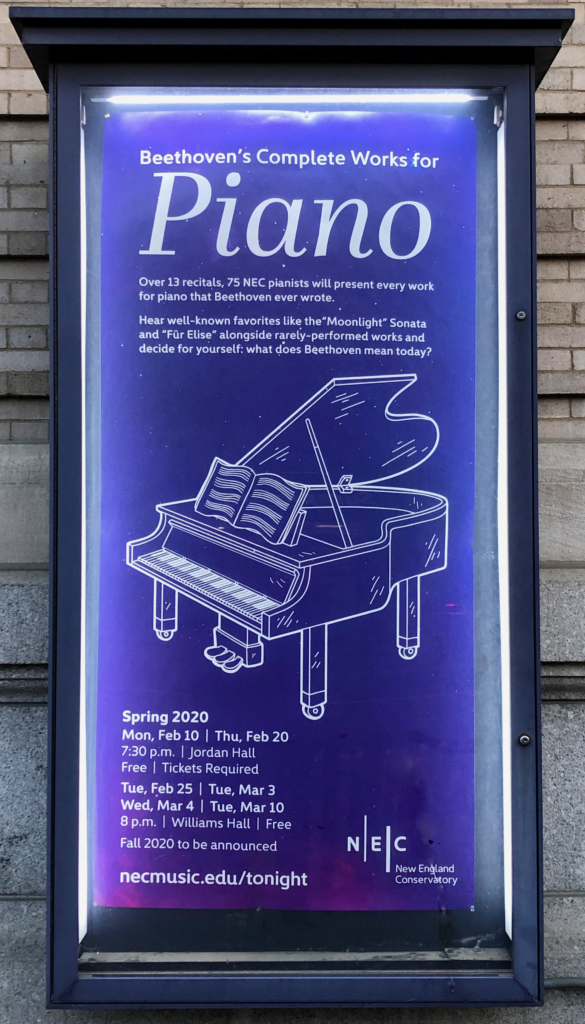During 2020, at New England Conservatory, it happened — every piano piece by Ludwig van Beethoven was performed. There was a series of 12 concerts involving 73 different NEC students. All 36 piano sonatas were played, 21 sets of variations, and every other piano piece! Six of the concerts were played live during February and March. After the pandemic arrived, the rest of the programs were streamed during the fall. Studying remotely, many students recorded their playing wherever they were throughout the world; their recordings were assembled for the online stream.
Through centuries, European classical music has become focussed on a small amount of music by a few composers believed to be superior. The classical music community needs to reconsider. Even the language we use — terms such as “great,” “greatness,” “classical,” or “masterpiece” — encodes old hierarchies, exclusionary bias, and prejudice. It’s difficult to separate music from social and societal structures. Racism, classism, and economic inequality are manifested in, and deeply intertwined with music. Recent essays, such as Philip Ewell’s “Beethoven Was an Above Average Composer — Let’s Leave It At That,” suggest that excessively venerating music such as Beethoven’s is an act of white supremacy.
Was the series of 12 concerts including every piano piece written by Beethoven an act of white supremacy?
2020 was the 250th anniversary of Beethoven’s birth. Classical musicians played and recorded and streamed even more music by Beethoven than they usually do. Although the concert series in Boston might seem like the usual sort of classical-music idolization of a dead “master,” I hoped it would be something else. Inclusion of all the less-known music re-centered and re-contextualized the famous pieces that we think we know so well. Beethoven’s many sets of variations (mostly not performed in recent times) show an artist engaged with musical culture around him. In a sense, the written variations are a “recording” of practices of improvisation. In public performances, musicians often improvised on themes, spontaneously embellishing and varying the musical material. To understand classical music better, the interrelationship between improvising and written composition needs more exploration.
My pride in the accomplishment of all those pianists performing all that music by Beethoven is tinged with doubt. Where is the path forward to a more inclusive, less exclusionary musical practice? How can “classical” musicians and the “classical music” audience become a more diverse group of people? Are some structures of power and repression encoded in certain music in such a way that we should avoid playing or hearing it?
Outside the classical music world, in movies in particular, Beethoven’s music has frequently been associated with evil. The so-called “Moonlight” Sonata is used to score a truly frightening scene of violence in the 1990 film Misery. The entire first movement of the “Moonlight” is used under a long “sequence shot” in Gus Van Sant’s 2003 film Elephant. Ominous in character, the scene precedes a deadly school shooting in the film. In Stanley Kubrick’s A Clockwork Orange, Beethoven’s music is a signifier, and even an agent of violence.
Sinister and dangerous qualities of the German classical repertoire are the basis of Mauricio Kagel’s “lieder-opera” Aus Deutschland. Does our knowledge that Adolf Hitler loved Beethoven’s music help explain the association of such music with evil? Or do these auteurs, these artists sense something even more fundamentally difficult that the music contains?
Michael Haneke’s 2001 film The Piano Teacher (La Pianiste), based on the novel by Elfriede Jelinek, links music by Robert Schumann and especially music by Franz Schubert to psychosis and masochism. Although some critics have felt that the music “floats free” from the perversity in the film, I cannot be sure that it is not this Germanic Romantic music and its underlying power structure that cause the characters’ suffering.
Is the musical paradigm of composer-performer-listener (master-slave-consumer) a structure that inevitably reinforces inequality, mandates domination and submission? These models, these systems and forms of musical learning and expression — our expertise — may prevent us from achieving social changes that we say we want.
In the field of “classics,” scholars such as Dan-el Padilla Peralta are proposing that the field itself needs complete overhaul. Recently, he said: “Systemic racism is foundational to those institutions that incubate classics and classics as a field itself. Can you take stock, can you practice the recognition of the manifold ways in which racism is a part of what you do?”
In many areas, in many fields, privileged individuals and privileged institutions now must move beyond our own discomfort and make actual change.


2020 was a year of reckoning in many ways. Inevitably, many forms of music and musical culture are going to change and reflect what’s happening all around.
What was done over centuries will not be undone in months or years.